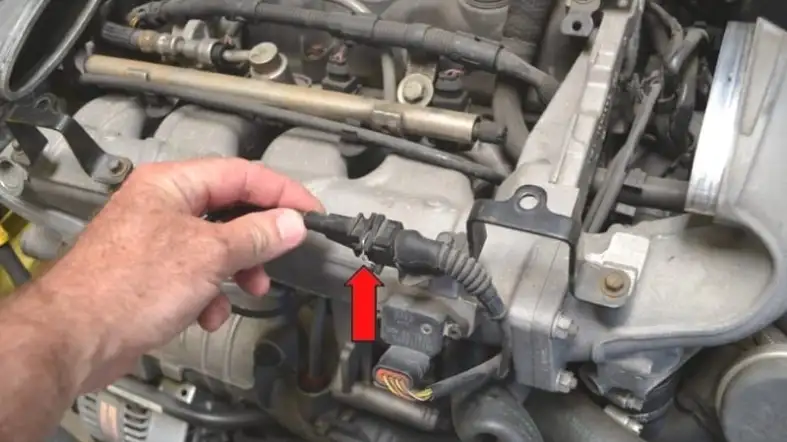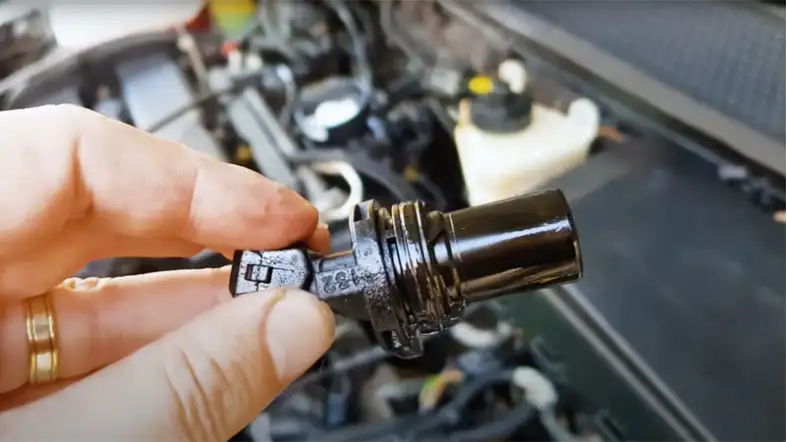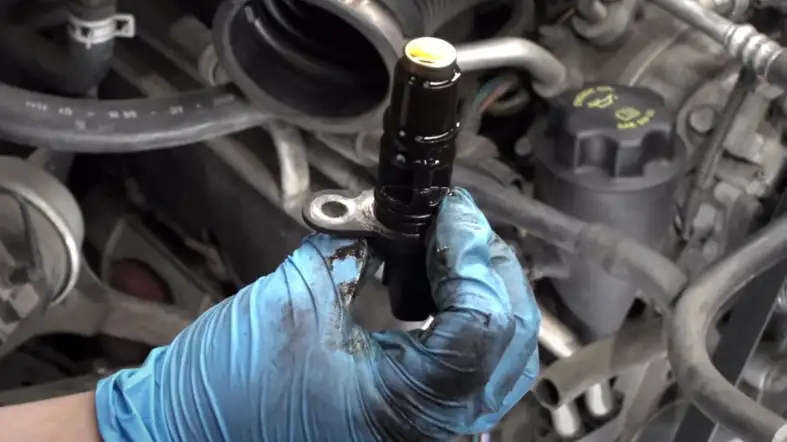Are you experiencing a mysterious knocking sound coming from your engine?
A knocking engine can be a sign of a serious problem under the hood, and it’s essential to get to the root cause of the issue before it spirals out of control.
One potential culprit that you may not have considered is a bad camshaft sensor.
Yes, you read that right – this small, unassuming component could be responsible for the unsettling sounds emanating from your engine.
But can a bad camshaft sensor really cause knocking, or is it just a coincidence? We’ll discuss the camshaft sensors in this blog.
Can a bad camshaft sensor cause knocking?
Yes, a bad camshaft sensor can cause knocking in an engine.

The camshaft sensor is an important component in the engine that is responsible for detecting the position of the camshaft and sending that information to the engine control module (ECM).
The ECM uses this information to determine the correct timing of the fuel injection and ignition system.
What Causes Engine Knocking?
Engine knocking is a common problem that can occur in both old and new cars.
It is characterized by a knocking or pinging sound that comes from the engine when it is running.
This sound is often accompanied by a loss of power or a rough-running engine. Engine knocking can be caused by a number of factors, including:
1. Low-Quality Fuel:
Using low-quality or contaminated fuel can cause engine knocking.
This is because the fuel may contain impurities or additives that can cause the fuel to ignite prematurely, causing the knocking sound.
2. Incorrect Fuel Octane Rating:
Using fuel with an incorrect octane rating can also cause engine knocking. This is because the octane rating determines the fuel’s ability to resist detonation.
If the fuel has a lower octane rating than what the engine requires, it may ignite too early, causing the knocking sound.
3. Carbon Buildup:
Over time, carbon deposits can build up in the engine’s combustion chamber. This can cause hot spots that ignite the fuel prematurely, causing the knocking sound.
4. Overheating:
If the engine overheats, it can cause the fuel to ignite prematurely, causing a knocking sound.
Overheating can also cause damage to the engine’s components, leading to engine knocking.
5. Worn Spark Plugs:
Worn spark plugs can cause incomplete combustion, leading to the fuel igniting prematurely and causing a knocking sound.
6. Timing Issues:
If the engine’s timing is off, it can cause the fuel to ignite at the wrong time, causing the knocking sound.
7. Engine Damage:
Damage to the engine’s components, such as the pistons or bearings, can cause engine knocking.
This is because the damaged components may cause the fuel to ignite prematurely.
8. Improper Oil Level:
An improper oil level can cause engine knocking. This is because the oil helps to lubricate the engine’s components and if there isn’t enough oil, the components may start to rub against each other, causing damage and engine knocking.
What are the signs of a Bad Camshaft Sensor?

If the camshaft sensor isn’t functioning properly, it can cause a number of issues with your vehicle’s performance.
Here are some signs that your camshaft sensor might be going bad:
1. Check engine light:
The most obvious sign of a bad camshaft sensor is the illumination of the check engine light on your dashboard.
This can happen for a variety of reasons, but if you’ve ruled out other issues and the check engine light is still on, it could be a sign that your camshaft sensor needs to be replaced.
2. Engine misfires:
If the camshaft sensor isn’t providing accurate information to the engine’s computer, it can cause the engine to misfire or run roughly.
This can be especially noticeable when accelerating or when idling.
3. Reduced power and acceleration:
Along with engine misfires, a bad camshaft sensor can cause your car to lose power and acceleration.
This can be frustrating if you’re trying to pass another vehicle on the highway or if you need to quickly accelerate from a stop.
4. Stalling:
In extreme cases, a bad camshaft sensor can cause your car to stall or even refuse to start.
If you’re experiencing this issue, it’s important to have your vehicle inspected by a mechanic as soon as possible.
5. Poor fuel economy:
If the camshaft sensor isn’t providing accurate information to the engine’s computer, it can cause your car to burn more fuel than necessary.
This can lead to reduced fuel economy and more frequent trips to the gas station.
What to Do if Your Camshaft Sensor Is Bad?

If your car’s camshaft sensor is bad, it can lead to various issues such as poor engine performance, difficulty starting your car, and even stalling while driving.
Here are some steps you can take if you suspect your camshaft sensor is bad:
1. Check for error codes:
The first thing you should do is to check for any error codes that might be stored in your car’s computer system.
You can do this by using an OBD-II scanner, which is available at most auto parts stores. This will give you a better idea of what might be causing the problem.
2. Inspect the sensor:
If you suspect that the camshaft sensor is bad, you can visually inspect it for any damage or wear. Look for any signs of physical damage such as cracks or corrosion.
3. Clean the sensor:
Sometimes, a camshaft sensor can become dirty or contaminated, which can cause it to malfunction.
You can clean it using a soft, lint-free cloth and some electronic contact cleaner.
4. Replace the sensor:
If the camshaft sensor is damaged or worn out, you will need to replace it. You can purchase a new sensor from an auto parts store or online.
The replacement process will depend on the make and model of your car, but it typically involves disconnecting the sensor from the wiring harness and removing it from the engine.
5. Test the sensor:
After replacing the camshaft sensor, you should test it to make sure that it is working correctly.
You can do this by using an OBD-II scanner or by taking your car for a test drive to see if the performance has improved.
How to prevent Bad Camshaft Sensor from damage?
Here are some tips to prevent damage to your camshaft sensor:
1. Follow the manufacturer’s maintenance schedule:
Regular maintenance, such as oil changes and tune-ups, can help prevent damage to your camshaft sensor.
These services can help keep your engine running smoothly, which can reduce the likelihood of sensor failure.
2. Use high-quality parts:
When replacing your camshaft sensor, be sure to use high-quality parts that are designed to meet the specifications of your vehicle.
Cheaper, lower-quality parts may not function properly, which can lead to sensor failure.
3. Keep your engine clean:
Dirt and debris can cause damage to your camshaft sensor, so it’s important to keep your engine clean.
This includes regular washing and detailing, as well as ensuring that your air filter is clean and functioning properly.
4. Address engine problems promptly:
If you notice that your engine is running rough or experiencing other issues, it’s important to address these problems promptly.
Ignoring engine problems can put additional stress on your camshaft sensor, which can lead to premature failure.
5. Avoid harsh driving conditions:
Driving in extreme temperatures or harsh conditions, such as off-roading, can put additional stress on your engine and camshaft sensor.
Whenever possible, avoid driving in these conditions, or take steps to protect your vehicle, such as installing a skid plate or upgrading your cooling system.
FAQs
What Exactly Is Engine Knocking?
Engine knocking is a sound that can occur when the air/fuel mixture in the engine’s cylinders ignites at the wrong time or with too much force.
It can sound like a tapping or knocking noise and can be accompanied by a decreased performance or other symptoms.
How Do I Know If My Camshaft Sensor Is Bad?
If your camshaft sensor is malfunctioning, you may notice symptoms like rough idling, stalling, or decreased performance.
The check engine light may also come on, and diagnostic codes related to the sensor may be stored in the engine’s computer.
However, these symptoms could also be caused by other issues, so it’s important to have a qualified mechanic diagnose the problem.
Can I Drive My Car With A Bad Camshaft Sensor?
It’s not recommended to drive your car with a bad camshaft sensor.
The sensor plays an important role in the engine’s timing and fuel delivery, and if it’s malfunctioning, it could potentially cause damage to the engine or other components.
It’s best to have the problem diagnosed and repaired as soon as possible.
How Much Does It Cost To Replace A Camshaft Sensor?
The cost of replacing a camshaft sensor can vary depending on the make and model of your vehicle and the mechanic you go to.
On average, you can expect to pay anywhere from $100 to $300 for parts and labor.
However, this is just an estimate, and the actual cost could be higher or lower.
Conclusion
A bad camshaft sensor can indeed cause knocking in your vehicle.
This is because the sensor is responsible for detecting the position of the camshaft and ensuring that it is properly synchronized with the engine’s pistons.
When the sensor fails, it can cause a misalignment between the camshaft and the pistons, resulting in a knocking sound.
If you suspect that your camshaft sensor is faulty, it’s important to have it inspected and replaced by a qualified mechanic to avoid further damage to your engine.
